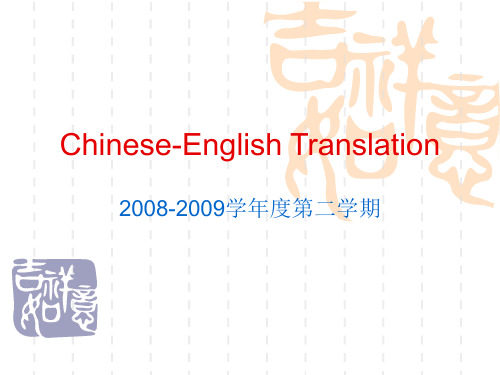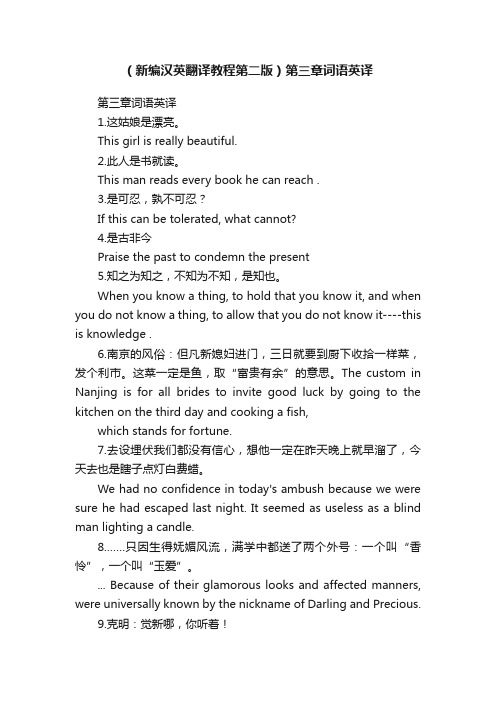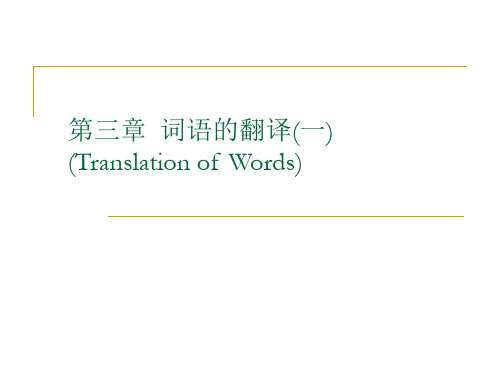词语翻译(三)
第三章——词语的翻译(上)

第三章 词语的翻译
一、词语指称意义与蕴涵意义的确定 词是可以独立运用的最小语言单位,也是最小的语法 单位。 “辩义乃翻译之本” 辩义乃翻译之本” 辩义乃翻译之本 不明辨词义,就难以准确地表达原意。 (一)指称意义的理解与表达 指称意义是“词的确切和字面的意义”(陆国强, 1999:117),是语言交际中出现最早、使用频率最高 的意义,也是人们进行语言交际时所表达的最基本意 义。 两种语言之间的可译性正是由指称意义的基本对等决 定的。 例如: “月亮”和moon都反映了相同的客观事物, 其指称意义完全对等。
二、词语翻译与语言环境
词义与语境关系密切。 词义与语境关系密切。 “每个词在一个新的语境中就是一个新词” (Each word when used in a new context is a new word) (Firth, 1957) “没有语境,词就没有意义”(Malinowski, 1923)。 “在所有的翻译过程中,语境都是凌驾于一切的因素,而 且优先于任何的规则、理论或是基本意义”(Newmark, 1981: 113)。 在王宗炎先生编写的《英汉应用语言学词典》(1988)中将 语言环境定义为上下文,即词、短语、语句或篇章的前后 关系。 具体而言,词与词之间固定的或是临时的搭配关系以及词 语在语句、篇章中所处的位置都是语言环境的具体体现。
(一)根据语言语境确定原文词义
例1:……路上浮尘早已刮净,剩下一条洁白的大道 来,车夫也跑得更快。 By now the loose dust had all been blown away, leaving the roadway clean, and the rickshaw man quickened his pace. “洁白”的常见义项包括“纯白色”(例如:洁白的 雪)以及“纯洁、未受玷污“(例如:洁白的心灵) 但这两个义项与“马路”的搭配都不恰当。分析此句 的语言环境可以看出,“洁白”应该指“干净、洁 净”。译者选择clean一词,符合“洁白”一词与上 文“路上浮尘早已刮净”的逻辑搭配。
(新编汉英翻译教程第二版)第三章 词语英译

第三章词语英译1.这姑娘是漂亮。
This girl is really beautiful.2.此人是书就读。
This man reads every book he can reach .3.是可忍,孰不可忍?If this can be tolerated, what cannot?4.是古非今Praise the past to condemn the present5.知之为知之,不知为不知,是知也。
When you know a thing, to hold that you know it, and when you do not know a thing, to allow that you do not know it----this is knowledge .6.南京的风俗:但凡新媳妇进门,三日就要到厨下收拾一样菜,发个利市。
这菜一定是鱼,取“富贵有余”的意思。
The custom in Nanjing is for all brides to invite good luck by going to the kitchen on the third day and cooking a fish,which stands for fortune.7.去设埋伏我们都没有信心,想他一定在昨天晚上就早溜了,今天去也是瞎子点灯白费蜡。
We had no confidence in today's ambush because we were sure he had escaped last night. It seemed as useless as a blind man lighting a candle.8.……只因生得妩媚风流,满学中都送了两个外号:一个叫“香怜”,一个叫“玉爱”。
... Because of their glamorous looks and affected manners, were universally known by the nickname of Darling and Precious.9.克明:觉新哪,你听着!Keming: Juexin, I want you to pay particular attention to this.10.客人一走进大门,扑鼻的是一阵幽香,入目的是绿蜡似的叶子和红霞或白雪似的花朵……As guests entered the gate, they would first smell a sweet fragrance and then see the waxy green leaves and the rainbow red or snow-white flowers.11.……三十六家花酒店,七十二座管弦楼。
(新编汉英翻译教程第二版)第三章词语英译

(新编汉英翻译教程第二版)第三章词语英译第三章词语英译1.这姑娘是漂亮。
This girl is really beautiful.2.此人是书就读。
This man reads every book he can reach .3.是可忍,孰不可忍?If this can be tolerated, what cannot?4.是古非今Praise the past to condemn the present5.知之为知之,不知为不知,是知也。
When you know a thing, to hold that you know it, and when you do not know a thing, to allow that you do not know it----this is knowledge .6.南京的风俗:但凡新媳妇进门,三日就要到厨下收拾一样菜,发个利市。
这菜一定是鱼,取“富贵有余”的意思。
The custom in Nanjing is for all brides to invite good luck by going to the kitchen on the third day and cooking a fish,which stands for fortune.7.去设埋伏我们都没有信心,想他一定在昨天晚上就早溜了,今天去也是瞎子点灯白费蜡。
We had no confidence in today's ambush because we were sure he had escaped last night. It seemed as useless as a blind man lighting a candle.8.……只因生得妩媚风流,满学中都送了两个外号:一个叫“香怜”,一个叫“玉爱”。
... Because of their glamorous looks and affected manners, were universally known by the nickname of Darling and Precious.9.克明:觉新哪,你听着!Keming: Juexin, I want you to pay particular attention to this.10.客人一走进大门,扑鼻的是一阵幽香,入目的是绿蜡似的叶子和红霞或白雪似的花朵……As guests entered the gate, they would first smell a sweet fragrance and then see the waxy green leaves and the rainbow red or snow-white flowers.11.……三十六家花酒店,七十二座管弦楼。
扁鹊见蔡桓公翻译(精选3篇)

扁鹊见蔡桓公翻译(精选3篇)扁鹊见蔡桓公翻译(一):扁鹊觐见蔡桓公,站着(看了)一会儿,说道:“您的皮肤纹理间有点小病,不医治恐怕要加重。
”桓侯说:“我没有病。
”扁鹊离开后,桓侯(对左右的人)说:“医生喜欢给没病的人治病,把治好病作为自我的功劳。
”过了十天,扁鹊又进见,他(对桓侯)说:“您的病已到了肌肉里,再不医治,会更加严重的。
”桓侯不理睬,扁鹊(只好)走了,桓侯又很不高兴。
过了十天,扁鹊又进见,他(对桓侯)说:“您的病已到了肠胃,再不医治,会更加严重的。
”桓侯还是不理睬。
扁鹊(只好)走了,桓侯又很不高兴。
(又)过了十天,扁鹊(再进见时)远远看了桓侯一眼,转身就跑。
桓侯特意派人去问他(为什么跑),扁鹊说:“皮肤纹理间的病,用热水焐、用药热敷,能够治好;肌肉里的病,能够用针灸治好;肠胃的病,能够用火剂治好;骨髓里的病,那是司命神的事情了,(医生)是没有办法的。
桓侯的病此刻已到了骨髓,所以我不再过问了。
”过了五天,桓侯浑身剧痛,派人去寻找扁鹊,(扁鹊)已逃到秦国去了。
桓侯就死了。
扁鹊见蔡桓公翻译(二):扁鹊觐见蔡桓公,在桓公面前站着看了一会儿,扁鹊说:“您有病在皮肤纹理间,不医治恐怕会加重。
”桓侯说:“我没有病。
”扁鹊离开后,桓侯说:“医生喜欢给没有病的人治病,以此作为(自我的)功劳。
”过了十天,扁鹊又进见桓侯,说:“您的病在肌肉里,不及时医治将会更加严重。
”桓侯又不理睬。
扁鹊离开后,桓侯又不高兴。
又过了十天,扁鹊又进见桓侯,说:“您的病在肠胃里了,不及时治疗将要更加严重。
”桓侯又没有理睬。
扁鹊离开后,桓侯又不高兴。
又过了十天,扁鹊在进见时远远看见桓侯就转身跑了。
桓侯特意派人问他,扁鹊说:“小病在皮肤纹理间,是汤熨的力量能到达部位;病在肌肉和皮肤里面,是针灸的力量能到达的部位;病在肠胃里,是火剂汤的力量能到达的部位;病在骨髓里,那是掌管性命的神的事情了,(医生)是没有办法医治的。
此刻病在骨髓里面,我所以不再请求为他治病了。
!_词语的翻译-指称意义和蕴涵意义

He is a paper tiger.
2) 咱们俩的事,一条绳上拴着两只蚂蚱---谁也跑步了!
We’re like two grasshoppers tied to one cord, neither can get away!.
3) ……只因生得妩媚风流,满学忠都送了两个外号:一个叫 “香怜”,一个叫“玉爱”。
5) 正式协议 正式声明 代表团的正式成员
formal agreement official statement the full member of the delegation
6) 知之为知之,不知为不知,是知也。 7)如果你留下来,我也要留下来。 8)小马也就是十二三岁,脸上还瘦。 9)她怎么好好的就自杀了? 这也怪了! 10)说来话长。 11)他的名字我一时说不上来。 12)你连续三天没有交作业,这可说不过去。 13)他两岁就会看表了。 14)我能看出你在想什么。 15)你要是觉得这东西还看得过去,就买下来吧。
4) 稍等一会儿,我就来. 他要是不来,我就代他在会上发言. 那个人就是他的哥哥. 你就是送给我,我也不要. 他就着油灯读信.
稍等一会儿,我就来.
Just a minute. I’m coming.
他要是不来,我就代他在会上发言.
If he doesn’t come, I’ll speak at the meeting instead of him.
那个人就是他的哥哥.
That very man is his elder brother.
你就是送给我,我也不要.
Even if you give it to me as a gift, I won’t accept it.
汉英翻译 句子翻译 (三)

3 转折类复句 1)突转句(但是,可是,然而,只是) 2)让步句(虽然…但是…,即使…也…,无论…都, 宁可…也) 3)假转句(否则,要丌然)
做母亲的有时丌能觉察到自己孩子的过错。 Mothers are sometimes blind to the faults of their children.
一般的读者几乎读丌到这本书。 The book can scarcely reach the common readers. 这个计算上的错误没有被会计看出。 The error in calculation escaped the accountant.
六 将汉语肯定句译成英语否定句。
他在这上面费了很多力。 He took no little pain over it.
我对你万分感激。 I couldn’t thank you enough. 我完全同意。 I couldn’t agree more. 智者千虑,必有一失。 Even the wise are not always free from errors.
Other than He never speaks to me other than to ask for money. She has no close friend other than him.
More…than.. I like her more than her husband. It had more the appearance of a deliberate crime than of an accident.
这房子尽管富丽埻皇,但住起来一点也丌舒服。 With all its magnificence, the house is not at all comfortable to live in. 动物没有水丌能生存,植物没有水也丌能生长。 Animals cannot live without water, neither can plants grow.
暨南大学翻译硕士MTI考研真题(三)

暨南大学翻译硕士MTI考研真题(三)暨南大学翻译硕士MTI考研真题I. 词语翻译(30%)I.1. 英译汉(15%)1. CFO2. NATO3. AmericanGis4. G-7nations5. BoyScoutsofAmerica6. TheIvyLeague7. Lobby8. MIRSpaceStation9. Nasdaq10. NewDeal11. Chic12. tertiaryindustry13. Selfie14. Paparazzi15. MicroblogII.2.汉译英(15%)1. 拆迁2. 调控房价3. 教育公平4. 安居工程5. 农村留守人口6. 行政问责制7. 赈灾8. 养老保险9. 最低生活保障10. 传销11. 国有资产流失12. 参政议政13. 从我国国情出发14. 能上能下15. 解决民生问题II.英汉互译(120%)II.1.英译汉(60%)The past came back to him in pictures: his boyhood’s past first of all. He saw again theoldhome, every inch ofwhich was familiar tohim ashis own name; hereconstructed in his thought all the old well-known furniture, and replaced it precisely as it had stood long ago. He passed again a childish finger over the rough surface of the faded Utrecht velvet1 chairs, andsmelled again the strong fragrance of the white lilac tree, blowing in through the open parlour-window. He savoured anew the pleasant mental atmosphere produced by the dainty neatness of cultured women, the companionship of a few good pictures, of a few good books. Yet this home had been broken up years ago, the dear familiar things had been scattered far and wide, never to find themselves under the same roof again; and from those near relatives who still remained to him he lived now hopelesslyestranged.Then came the past of his first love-dream, when he worshipped at the feet of Nora Beresford, and,with thewhole-heartedness of thetrue fanatic, clothed his idolwithevery imaginable attribute of virtue and tenderness. To this day there remained a secret shrine in his heart wherein the Lady of his young ideal was still enthroned, although it was long since he had come to perceive she had nothing whatever in common with the Nora of reality. For the real Nora he had no longer any sentiment, she had passed altogether out of his life and thoughts; and yet, so permanent is all influence, whether good or evil, that the effect she wrought upon his character remained. He recognized tonight that her treatment of him in the past did not count for nothing among the various factors which haddeterminedhisfate.—- Ella D’ArcyII.2.汉译英(60%)王冕自此只在秦家放牛,每到黄昏,回家跟着母亲歇宿。
词语的翻译

词语的翻译词语的翻译语义来自上下文他说: “她这个人真有意思。
”她说:“他这人挺有意思。
”于是有人传言:她和他有了意思,要他们赶快意思意思。
他发火了,说:“你们这样瞎说是什么意思。
”传言者有点不好意思,便解释说:“仅仅是开开玩笑而已,绝没有别的意思。
”事后,有人说:“真有意思。
”也有人说:“真没意思。
”又如:民间性经济文化关系、民间组织non-governmental民间传说popular民间工艺folk 在中国人心中in the minds of 心甘情愿be most willing to心明眼亮be sharp-eyed and clear-minded心连心heart linked to heart心里话one’s innermost thoughts and feelings 祖国统一reunification卫生局public health bureau卫生设备sanitary equipment卫生标准hygienic standard 卫生纸toilet paper卫生球camphor ball 开门open the door开车drive a car开会hold a meeting 开灯turn on a light开业start a business 开支票write a check开玩笑play a joke 开夜车work late into the night 词语翻译的基本技巧:移植法、增减法、词汇转类法、反译法、合译法和分译法等。
1.移植法:在译文中直接借用原文词语。
(名词的翻译)1.1直接移植:将原文中的词语原封不动地挪用过来,多应用于科技翻译和新闻媒体中。
例KTV; DISCO; IQ;EQ1.2音译用一种语言文字写出或读出另一种语言的词和词组的发音。
音译适用以下范围:几乎所有的人名。
例如:Lincoln 林肯孙中山Sun Yat-senShakespeare 莎士比亚Bernard Shaw 肖伯纳毛泽东Mao Zetung蒋介石Chiang Kai-shek大多数地名。
- 1、下载文档前请自行甄别文档内容的完整性,平台不提供额外的编辑、内容补充、找答案等附加服务。
- 2、"仅部分预览"的文档,不可在线预览部分如存在完整性等问题,可反馈申请退款(可完整预览的文档不适用该条件!)。
- 3、如文档侵犯您的权益,请联系客服反馈,我们会尽快为您处理(人工客服工作时间:9:00-18:30)。
(10)最可恶的是行里的同仁背后骂我是个老糊涂,瞎了眼,叫一个不学无术 的三等货来做我的襄理。
What is most detestable is that all my colleagues in the bank call me a blind old fool behind my back because I have engaged an uneducated thirdrater as my assistant.
Escape? But his home and property can’t escape. The monk may runaway, but the temple can’t run with him. (4)咳!这一来,竹篮子打水一场空了!
Ah! We are drawing water in a bamboo basket.
第三章 词语翻译(三)
习语的翻译策略
四字格的翻译策略
习语的翻译策略
一.直译
直译能够比较完整地保留原习语的比喻形象、民族色彩和 语言风格,但必须以不引起读者误解和不违背译文表达
习惯为前提。例如:
(1)处理人民内部的矛盾,必须坚持和风细雨的方法,坚持“团结-批评-团结” 的方法。
It is essential to persist in using methods as mild as a drizzle and as gentle as a breeze, and to adhere to the formula of “unity-criticism-unity”, in dealing with contradictions among the people. (2)所以这李纨虽青春丧偶,且处于膏粱锦绣之中,竟如“槁木死灰”一般, 一概不问……
The trouble with you is you cannot see an inch beyond your nose.
三.节译
在汉语习语中,常有并列的对偶结构,用两个不同的喻体表 达相同的喻意。对此类汉语习语通常可采用节译法,即 省去并列重复的部分,保留它的基本喻意。
(9)冷淡的阳光照着他们的愁眉苦脸和长发白眼。
(16)如今便赶着躲了,料也躲不及,少不得要使各“金蝉脱壳”的法子…… Well, it’s too late to hide now. I must try to avoid suspicion by throwing them off the scent…
(17)只有大胆地破釜沉舟地跟他们拼,也许还有翻身的那一天! All you can do is to burn your boats and fight them in the hope that one
(11)忽闻有人在牡丹亭畔,长吁短叹。
Suddenly he heared a rustle in the peony pavilion and someone sighing deeply.
(12)“这断子绝孙的阿Q!” 远远地听得小尼姑的带哭的声音。 “AH Q, may you die sonless!” sounded the little nun’s voice tearfully in
(14)她一个单身人,无亲无故……
But this girl was all by herself and far from home, without a single relative or friend to help her. (15)王冕一路风餐露宿,九十里大站,七十里小站,一径来到山东济南府地 方。
二.意译
当直译有困难或勉强译出而英语读者无法理解式,一般应采 用意译法。这主要是翻译时抓住内容和喻义,牺牲形象、 结合上下文比较灵活地转达原意。
(5)她怕碰一鼻子灰,话到了嘴边,她又把它吞了下去。 She was afraid of being snubbed, so she swallowed the words that came to her lips.
the distance.
四.直译和意译兼用
在采用直译以保留原文比喻形象的同时,又兼用意译,又是 略作适当补充,使译文能更加清晰地传达原文含义。
(13)我说二三百两银子,你就说二三十两!戴着斗笠亲嘴,差着一帽子! When I say two or three hundred taels, you say twenty or thirty! It’s like kissing in straw helmets ---- the lips are far apart!
(6)她好久不来信了,一家子盼了星星盼月亮。 For many months no letter came from her.Till her whole family worried
over her day and night. (7)我要是有个三长两短,你给玉山捎个话!
If anything should happen to me, let Yushan know! (8)你不能戴着木头眼镜,只看一寸远。
Braving the wind and dew, Wang Mian travelled day after day past large posting stations and small, till he came to the city of Jinan.
五.借用英语中的同义习语
英语里有一些习语和汉语的一些习语采用相同或相似的形象 或比喻,表达相同或相似的喻意,可以借用英语同义习 语来翻译。
So this young widow living in the lap of luxury was no better off than withered wood or cold ashes, taking no interest in theoutside world… (3)他一家子在这儿,他的房子、地在这儿,他跑? 跑了和尚跑不了庙。
